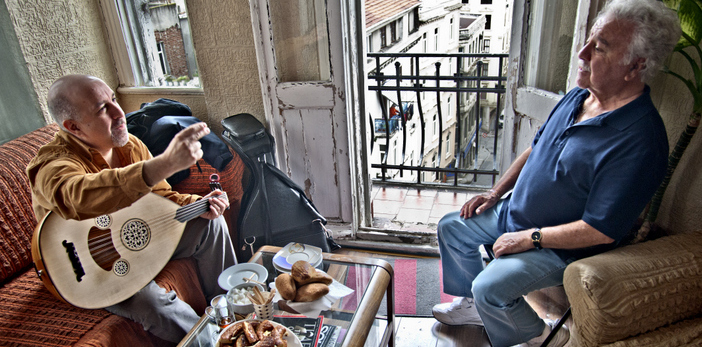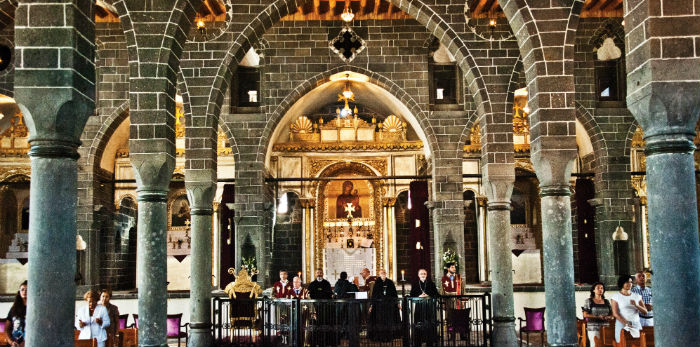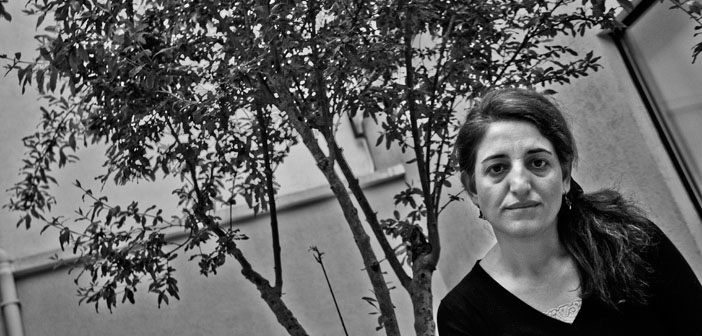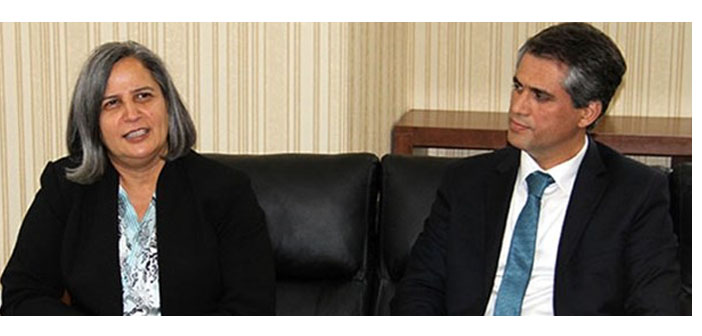After Onnik Dinkjian’s concert with his son Ara Dinkjian on October 24, Silva Özyerli told the journey that she went on with the songs of Onnik Dinkjian, who is also from Diyarbakir like her.
Lives of each of us are unique and idiosyncratic, but sometimes there are stories so similar that they touch each other and become harmonious. The fact that we live in different places that are miles and miles away from each other doesn’t make us distant; on the contrary, it draws us together. Just like we share the joy of finding a lost acquaintance after years, Onnik Dinkjian’s “garod” performance brings us together with the sorrow of longing and missing.
In addition to being from Diyarbakir, we have another thing in common with Onnik Dinkjian: our mothers are “Zora” with beautiful and poignant voices. More importantly, they both had a burden, a “hunchback”, caused by the longing they felt for their motherland; maybe the weight of the longing, missing and a heritage that they left behind.
For Onnik Dinkjian, who was born in Paris in 1929, Dikranagerd or Diyarbakir is like a fairytale, a lullaby that touched his ears at his childhood; sometimes, it is the melody of a lament and sometimes it is the longing itself. On the other hand, I lived in Diyarbakir, walked its streets and became a whole by growing there.
In Diyarbakir hammams
Onnik Dinkjian appears on the stage and sings the melodies of a city that he has never seen in Diyarbakir Armenian that he couldn’t have spoken with anyone, and he grows prodigiously on the stage. And I am left alone with the modesty of living in that city, I grow smaller. Somehow, I lose my composure. My emotions become confused. My soul leaves my body. My eyes, ears and hands are no longer mine; they start to move independently without any control; all of my parts become captivated by a different emotion. While my fingers drum, my eyes start watering. While my body is rooted in the chair, my soul goes on a journey accompanied by melodies, memories and experiences. It walks the streets.
When Onnik Dinkjian sings “Vay Babo”, which is a hammam ballad, I begin to wander in hammams. I go to “Paşa Hammam” most. He says, in Diyarbakir Armenian, “Şıpt or pağniki or e”, meaning “Saturday is the hammam day” and leaves me alone in the middle of a crowded hammam. The voices that I remember from my childhood come to my ears again. The noisy clamors and murmurs that pierce the dome of hammam follow one another: “We don’t want to wash from the same basin with these “xaço” (cross worshippers), these unbelievers!” The hand basins that were made by meticulous Armenian coppersmiths and clogs become weapons! The violence becomes contagious and begins to flow with water. Unfortunately, the violence multiplies… And the owner of hammam comes to the help of us and stops the fight: “Saturday is the hammam day of Christians. If you don’t want to wash with them, you should come another day!” Thus, the hand basins and clogs are begun to be used properly. We are left alone with our “unbeliever” selves, naked.
Ballads falling on the dry soil
Onnik Dinkjian starts to sing the wedding ballad “Pesan Tıraş Mın Ennink”, meaning “Shave the groom” and I begin to visit some places again. Sometimes, I lose myself among the people sitting on earth-shelters of the homes to watch the wedding and sometimes, I become a relative of the newlyweds. I watch my late brother being shaved in the yard of Surp Giragos Church. My body hangs from the strings and the high-pitched sound of the “cümbüş. In an instant, I find myself on the dry and stretched leather of darbuka. Sometimes, I find myself in a henna tray and sometimes the candles on me die down while passing from hand to hand. I stand in the dark with fear. My colors lose themselves in the crimson henna; they dissolve… I become a piece of a worn-out cloth that hacked to pieces. Shattered… I unfold the clothes around my hand and see my palms dyed with henna. It looks like dried blood. I disappear. My body becomes invisible.
Onnik Dinkjian sings “Mamis”, my mother, ballad; at that moment, melodies sound like lament and I fall on the dry soil like rain and bring prosperity to all “Zora, Mari and Arşaluys”…
In the smell of rose and coffee
Onnik Dinkjian sings “Eys Kişer Hampartsum e”, meaning “This night is Hampartsum” and the scent of the roses reaches my nose all the way from Gazi Köşkü (Veterans Pavilion). I spread the smell of the fresh roasted coffee that was pounded in the mortars in houses made of basalt. Sometimes, I turn into a poppy field or a chamomile garden. I regenerate and herald the spring. People pluck my white pedals one by one and play loves me loves me not.
Onnik Dinkjian sings “Diyarbekir’i Hokin”, meaning Diyarbakir’s spirit, and I become silent and frozen. I know that Diyarbakir Walls are also called “Bodies of Diyarbakir”. My soul and body get separated, because I feel incomplete and alone. A scream comes from the depth of my heart and I shout: “They shoot the stones now!” I feel grieved, I suffer…
Suddenly, I feel a kiss on my wet cheek; a kiss from my daughter that I forget that she is sitting next to me and she wonders: “Your fingers drum, but at the same time your eyes are watering; how is that possible?” Then she begs me: “Don’t cry. Please mama, don’t cry!”
All my parts that have changed dimension and lost control slowly gather together and find their proper places in silence. I utter some words almost unconsciously and they spill on the red carpet: “I will vote for you, but then you have to give Diyarbakir of my childhood back…”





